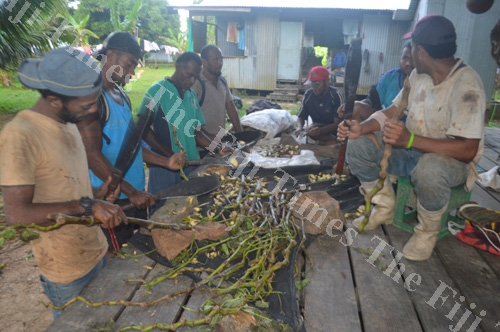OVERLOOKING the coastal shores of Tawake District, about 40,000 yaqona plants, some as old as eight years, are scattered in an area of about 500 acres.
The grog plants, which come under a farming scheme headed by the young men of Tawake Village in Cakaudrove started three years ago.
The two hours walk to the mountain top known as Le’utu was a good experience for this newspaper team.
The scheme, headed by Iliuta Naceva and Ben Chute, consists of 10 boys, who have been members since the scheme started.
It all started from informal discussions around the tanoa where Mr Chute and his cousin Mr Naceva thought of assisting the boys.
Without any outside assistance or reliant on Government and stakeholders for help to start the scheme, the two men, also of Tawake, established the project.
“We started our own farms at first and after a few discussions, we thought of involving the boys and basically empowering them economically,” Mr Chute said.
“So we got 10 boys who were willing to join and we set up a few rules for this scheme which the boys have upheld very well over the past three years.
“We also decided to pay the boys $20 a day to work on our farms for just three hours so we are paying the boys $7 an hour.”
Mr Chute said the scheme has funded the boys’ farming materials and gear.
“If they want us to buy their boots or fishing gear for them to have, then we deduct the amount from their weekly pay but is done in instalments,” he said.
“The boys, while working on this scheme, they also have their own grog farms in the area of our scheme and we encourage them to do that.
“So by the end of this year, they will start harvesting their grog and we have already organised their bank accounts which they will need to have.”
One of the rules of this scheme is to save as much as they can to build houses.
The members of this scheme are not allowed to buy vehicles without building their houses first.
“It’s the trend nowadays for young grog farmers to buy vehicles especially four-wheel-drives yet the value of vehicles drop as each year passes,” Mr Chute said.
“So we will let our members build their houses first because by the time they get married, they can take their wives into their own houses.
“And we also encourage our members to invest money into financial institutions and keep it for their education. They are still young, they can still educate themselves and they can pursue and achieve their dreams.”
The scheme members are also encouraged to make use of the qoliqoli.
Mr Chute said the scheme had also purchased fishing gear for the boys so their families can also benefit.
In the past three years, the boys have supplied Mr Chute with the grog to sell in Labasa and their products have attracted a lot of customers every day.
Sometimes, Mr Chute said customers knocked on their door as early as 2am and 3am and their relationship with the customers had strengthened over the years.
“Bus drivers, carrier drivers and even ten wheeler trucks stop by in front of our house and because we value our customers, we take the grog to them in their vehicle so they don’t get off,” he said.
“Customers even come and buy grog as early as 8am or 10am for businesspeople who love to mix their grog during working hours.
“So customers play a major role in this scheme and their contribution has helped us in many ways.”
While Mr Chute runs the scheme from town, his cousin Mr Naceva, looks after the boys at Tawake.
There are rules for the consumption of yaqona.
“The boys are not allowed to drink grog from Monday to Friday and only in the weekend then we have grog sessions to talk about our achievements in the past week and our plans ahead,” Mr Naceva said.
“The boys are also camping in Nakula, the Chute’s family estate and we are blessed that Ben has given us a house to stay in.
“So these boys plant their own food and go fishing as well to supply their meals at the camp. We have trained them to be independent and we also teach them how to farm grog and how to catch fi sh.”
Mr Naceva said if a scheme member disobeyed the club rules, they would be counselled and in most cases, such counselling had been effective.
Until today, the boys have not asked for assistance but two weeks ago, Minister for Youth Laisenia Tuitubou praised the scheme members for such initiative that would benefit them.
He has asked his officers in Labasa to contact officials of the Ministry of Agriculture so they could assist these boys.Mmembers






